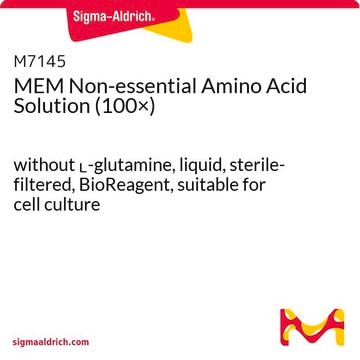59202C
L-Glutamina solution
29.23 mg/mL in saline, solution, suitable for cell culture
Fabricación farmacéutica
Sinónimos:
L-Glutamine solution
About This Item
Productos recomendados
Quality Level
description
for research or for further manufacturing use
sterility
sterile; sterile-filtered
form
solution
technique(s)
cell culture | mammalian: suitable
components
L-glutamine: 29.23 mg/mL
shipped in
dry ice
storage temp.
−20°C
SMILES string
N[C@@H](CCC(N)=O)C(O)=O
InChI
1S/C5H10N2O3/c6-3(5(9)10)1-2-4(7)8/h3H,1-2,6H2,(H2,7,8)(H,9,10)/t3-/m0/s1
InChI key
ZDXPYRJPNDTMRX-VKHMYHEASA-N
¿Está buscando productos similares? Visita Guía de comparación de productos
General description
Storage Class
12 - Non Combustible Liquids
wgk_germany
WGK 1
flash_point_f
Not applicable
flash_point_c
Not applicable
Certificados de análisis (COA)
Busque Certificados de análisis (COA) introduciendo el número de lote del producto. Los números de lote se encuentran en la etiqueta del producto después de las palabras «Lot» o «Batch»
¿Ya tiene este producto?
Encuentre la documentación para los productos que ha comprado recientemente en la Biblioteca de documentos.
Los clientes también vieron
Artículos
Importance and uses of glutamine in hybridoma and mammalian cell culture
Importance and uses of glutamine in hybridoma and mammalian cell culture
Importance and uses of glutamine in hybridoma and mammalian cell culture
Importance and uses of glutamine in hybridoma and mammalian cell culture
Nuestro equipo de científicos tiene experiencia en todas las áreas de investigación: Ciencias de la vida, Ciencia de los materiales, Síntesis química, Cromatografía, Analítica y muchas otras.
Póngase en contacto con el Servicio técnico










